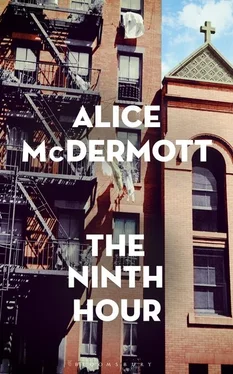“Reprieved!” Sister Illuminata would declare whenever the young nun appeared. There was no keeping the resentment out of her voice. “Curfew will not ring tonight,” she would add, pouting and jealous, but also, with the next thought, forgiving the two young women their clear delight in one another. Like is drawn to like, after all, and Sister Illuminata had been young once herself, arm and arm with one narrow, grimy, funny girl, Mary Pat Shea. She could recall the strong grip of Mary Pat’s arm, the boggy smell of her, the freckles and dirty fingernails and shining green eyes, the muscular, lithe, little body beside her own. Sister Illuminata had, in another lifetime, known that same delight.
“Do you need a breath of fresh air?” Sister Jeanne might ask. Or, “Do you want to run out and get yourself a soda?” “Do you want to do some shopping?”
This routine, too, had begun at Sister Lucy’s insistence. In the early days of Annie’s work at the convent, when Sally was still an infant, Sister Lucy put her eyes on Sister Jeanne as they left the chapel after the Ninth Hour prayer. “If you’re free this afternoon, go downstairs and take over with the baby,” she told her. Sister Lucy could insist. “Let the mother go out and catch her breath.”
“Do you mind?” Annie always asked, looking up at the little nun, laughing despite the way Sister Illuminata, jealous and pouting, was abruptly rolling back her sleeves or sucking her scarred fingertip.
And Sister Jeanne would skip down the stairs. “Do I mind?” as if the question couldn’t be more absurd.
With her clasped hands to her heart, holding back her crucifix, Sister Jeanne peered into the wicker laundry basket where Sally slept or, as the child grew, hiked up her skirt to join her on the floor for whatever game she had devised out of soap animals and scraps of cloth and empty spools of thread.
The girl delighted her. In fact, every child delighted Sister Jeanne. She was a practical nurse without formal training, and what skills she had were sometimes limited by her size and her strength, but her way with children was astonishing. Perhaps because, even in full habit, she seemed to be one of them: small and soft-spoken and easily given to laughter or tears, but also with a kind of sly skepticism in her eyes whenever she raised her chin to attend to some tall adult. A skepticism it seemed only the children could perceive, and share. Sister Jeanne need only turn her face from some serious, long-winded grown-up, a parent, a priest, a doctor, even one of the other nuns, to the child in the room and some understanding was established. It’s all silliness, isn’t it?—her eyes alone could convey. Let’s not let them know we know.
Didn’t she do as much for us?
Because of her small size and her talent with little ones, more often than not the casework Sister Jeanne was given was very sad: sick children, failing newborns, toddlers neglected or abused or abandoned. Her expertise was in the eradication of scabies, ringworm, lice, the application of castor oil and poultices, the cleaning of ears and the soothing of tears. Sister Jeanne knew the route to the various Brooklyn orphanages, or to the Foundling Home in Manhattan, better than any of the others. It was often her task to accompany the children there, sometimes from the gate of a cemetery, sometimes from the court or the station house, sometimes from the very room where the poor mother, newly cold, still lay, the gamy odor of death already encroaching on the still air.
Out on the street with her charges, Sister Jeanne could make the trip an enchantment for the trembling little ones, pulling sugar cubes from her deep pockets or leaning down to point out something, or someone, that would make them laugh. She could negotiate the subway stairs and the crowded streets with a sleeping newborn tucked into the crook of her arm. And always—always, the Sister who accompanied her would report to the others—Sister Jeanne made the trip back to the convent in snuffling tears.
What Sister Jeanne struggled to keep in balance was the sorrow she felt at the suffering of the sick and her own perpetual wonder at the miracle of the healthy. Sally was healthy—nine pounds when she was born and strong-limbed and rosy-cheeked as a toddler and young girl—and Sister Jeanne looked forward to seeing her in the basement laundry after a sad day with a failing child or a grieving mother, if only to assure herself that God was, after all, as generous with good health as He was with bad.
She would hike up her skirt and join the girl on the small Persian rug, relishing her plump hands and bright eyes, her cleverness—by four she knew the name of every nun in the convent—her rapid growth; reassuring herself that the consumptive girl whose death she had recently attended was now restored in heaven with this same robust beauty. Telling herself that the poor mother’s wailing sorrow would be transformed, not now, but soon—life was like the blink of an eye—into Annie’s same joy as she took her healthy daughter into her arms here in the streaming afternoon light and said, “I’ll be back in a jiff.”
“Take your time,” Sister Jeanne would say or, quoting Sister Lucy, “Go catch your breath,” which made them both laugh.
When Annie had gone, Sister Jeanne and the child climbed the stairs. (“No, I’ll be fine,” Sister Illuminata might call after them. “Still so much to do. You’ll have to send my supper down.”) They stopped into the pretty chapel to kneel together and say their prayers. They went to the kitchen for some biscuits and a glass of milk, or—if it was far enough before dinner preparations were to begin—to mix up a pudding or a fool. When the weather was fine, they’d go out to the convent yard, where they’d dig in the garden with a spade and an old spoon. When it rained, they sat in the elegant parlor and said a rosary—Sister Jeanne making a fairy story of sorts out of each of the Mysteries—the girl counting the nun’s beads and, more often than not, drifting to sleep beside her.
It was on these damp afternoons, in their brief and unaccustomed idleness, that Sister Jeanne considered Jim.
Sister Jeanne believed with the conviction of an eye witness that all human loss would be restored: the grieving child would have her mother again; the dead infant would find robust health; suffering, sorrow, accident, and loss would all be amended in heaven. She believed this because, because (and she only possessed the wherewithal to explain this to children—trying to say it to angry or grieving or bitter adults only left her tongue-tied), because fairness demanded it.
It was, to her mind, a simple proposition. The madness with which suffering was dispersed in the world defied logic. There was nothing else like it for unevenness. Bad luck, bad health, bad timing. Innocent children were afflicted as often as bad men. Young mothers were struck down even as old ones fretfully lingered. Good lives ended in confusion or despair or howling devastation. The fortunate went blissfully about their business until that moment when fortune vanished—a knock on the door, a cough, a knife flash, a brief bit of inattention. A much-longed-for baby slid into the world only to grow blue and limp in its mother’s arms. Another arrived lame, or ill-formed, or simply too hungry for a frail woman already overwhelmed. There was a child in the next parish with a skull so twisted his mouth couldn’t close, and every breath he took, every word he spoke, even his childish laughter, rattled through dry and swollen lips. Another with a birthmark like a purple caul. Blindness. Beatings. Broken or bent bones. Accident, decay. Cruelty of nature. Cruelty of bad men. Idiocy, madness.
There was no accounting for it.
No accounting for how general it was, how arbitrary.
Читать дальше










